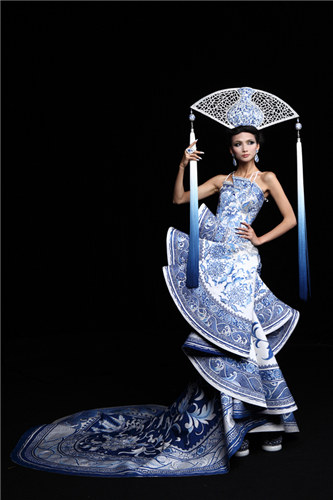 |
|
A model presents a dress designed by Guo Pei. [Photo provided to China Daily] |
Homespun couture a cut above the rest.
In December 1978, a middle-aged French man in an oversized drop-shoulder wool coat, strode across the streets of Beijing and caused a scene among local residents. In the following days, he caused an even bigger stir when he climbed atop the Great Wall and struck a victory pose with his arms.
The man was Pierre Cardin, the first Western fashion designer to visit China shortly after the country announced its policy of opening-up and reform to the world.
Three months later, the designer and entrepreneur organized the country's first fashion show at the Cultural Palace of Nationalities in Beijing by not only flying in 220 haute couture outfits from his archives, but also 12 professional models and a team of photographers, curators and stylists from Paris. Xinhua News Agency reported on the second day of the show, in an exclusive to apparel industry insiders, that the "variety of colors on runway contrasted sharply with the uniform black and gray of the audience".
 |
|
Dresses designed by Roberto Cavalli, Tom Ford for Yves Saint Laurent, and Christian Dior for House of Dior highlight elements of Chinese culture. [Photo provided to China Daily] |
Over the following decade, the "Marco Polo of the 20th century", as he was dubbed by the Chinese media, continued to make headlines in China. He set up shows on the Great Wall and at the Forbidden City, and opened them to the public for the first time-one of the events attracted an audience of 10,000 people. He also sent nine Chinese models to Paris to attend the fashion week there and to take part in a motorcade which saw the qipao-clad models being driven under the Arc de Triomphe in convertible cars flying the five-starred red flag.
By the late 1990s, Cardin had not only successfully persuaded Chinese consumers that any attire with the logo of his eponymous brand was the ultimate symbol of status, wealth and refinement, but he also proved to the world that the nation, a textile manufacturing giant, could also become a prodigious consumer of garments.
The first Western brand to be convinced by this was Italian luxury menswear brand Ermenegildo Zegna, which in 1991 made its Chinese debut by opening up its first fashion boutique in Beijing.